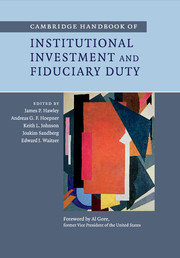Book contents
- Frontmatter
- Contents
- List of figures
- List of tables
- List of contributors
- Foreword
- 1 Introduction
- Part I Fiduciary duty: a global outlook
- Part II Fiduciary duty and the landscape of institutional investment
- Part III Challenging conventional wisdom on fiduciary duty
- Part IV Towards a broader interpretation of fiduciary duty
- 20 Fiduciary duty and the search for a shared conception of sustainable investment
- 21 Pension fund fiduciary duty and its impacts on sustainable investing
- 22 Reason, rationality and fiduciary duty
- 23 Socially responsible investment and the conceptual limits of fiduciary duty
- 24 Fiduciary duty at the intersection of business and society
- 25 Challenging conventional wisdom: the role of investment tools, investment beliefs and industry conventions in changing our interpretation of fiduciary duty
- Part V Beneficiaries’ roles and viewpoints
- Part VI Fiduciary duty and governance
- Index
- References
21 - Pension fund fiduciary duty and its impacts on sustainable investing
Published online by Cambridge University Press: 05 April 2014
- Frontmatter
- Contents
- List of figures
- List of tables
- List of contributors
- Foreword
- 1 Introduction
- Part I Fiduciary duty: a global outlook
- Part II Fiduciary duty and the landscape of institutional investment
- Part III Challenging conventional wisdom on fiduciary duty
- Part IV Towards a broader interpretation of fiduciary duty
- 20 Fiduciary duty and the search for a shared conception of sustainable investment
- 21 Pension fund fiduciary duty and its impacts on sustainable investing
- 22 Reason, rationality and fiduciary duty
- 23 Socially responsible investment and the conceptual limits of fiduciary duty
- 24 Fiduciary duty at the intersection of business and society
- 25 Challenging conventional wisdom: the role of investment tools, investment beliefs and industry conventions in changing our interpretation of fiduciary duty
- Part V Beneficiaries’ roles and viewpoints
- Part VI Fiduciary duty and governance
- Index
- References
Summary
Introduction
This chapter considers the evolving application of fiduciary duty to pension funds and how this affects funds’ investment exposures to sustainability generally and environment, social and governance (ESG) factors more specifically. We focus principally on European and US pension funds. Fiduciary duty in the UK has developed through common law origins to exert particular influences on pension fund practices. A similar background applies to US pension funds that have been particularly influenced by the ERISA legislation of 1974. The pension funds from continental Europe have a different legal context from the UK and the US but share many of the same principles. While unique national circumstances and legal contexts dictate certain pension fund differences, the concepts underlying fiduciary duty taken from the UK and the US have broad similarities in all countries where agents invest institutional funds on behalf of others.
The core issues of fiduciary duty are that those who manage investments on behalf of others are bound by a number of fiduciary obligations (Woods and Urwin 2010). There are four principal forms of this obligation:
Loyalty: putting the interests of beneficiaries first when determining the investment strategy and avoiding conflicts of interest.
Prudence: investing to the standard of a prudent expert.
Diversification: diversify according to the principles of accepted investment theory.
Impartiality: avoid favoring the interests of a particular beneficiary or class of beneficiaries over others.
- Type
- Chapter
- Information
- Publisher: Cambridge University PressPrint publication year: 2014
References
- 1
- Cited by



